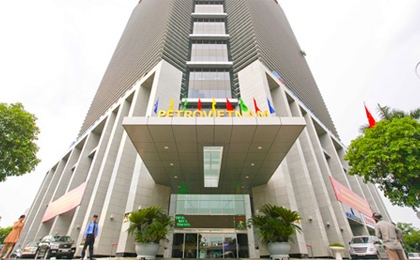State looks for an SOE sea change

Petrovietnam illustration photo
Nitin Jain, Ernst&Young Vietnam tax partner, told VIR the Vietnamese government’s economic restructuring that intensified state-owned enterprises (SOEs) reforms was “a big positive move enabling Vietnam to attract more foreign investors and providing private domestic and foreign enterprises with bigger room to play in the economy.”
“Many multinational companies are watching Vietnam equitise its SOEs as the scheme will offer good opportunities for them,” Jain added.
The Vietnamese government’s move was also praised by Australian economist Raymond Mallon, who has 20 years’ experience in studying Vietnam’s economy. “The master scheme is a big signal about the government’s strong commitment to economic reforms,” Mallon said.
“Accelerated efforts to restructure the state sector, improve state sector accountability and corporate governance, and improve the efficiency of public investments can help stimulate stronger growth,” he added.
The National Steering Committee for Enterprise Renovation and Development reported the total profit of Vietnam’s nine state-owned economic groups last year was VND127.51 trillion ($6.13 billion) only, down 5 per cent on-year. Meanwhile, Vietnam’s state-owned groups and corporations’ losses within 2012 totalled VND2.25 trillion ($108.1 million).
“Some enterprises have big foreign debts like Electricity of Vietnam, Vietnam Airlines and Vietnam Expressway Corporation,” said the committee’s vice chairman Pham Viet Muon.
Prime Minister Nguyen Tan Dung issued Decision 339/QD-TTg on February 19, 2013 approving the master plan on economic restructuring during 2013-2020, focusing on redistributing public investment, and reorganising credit institutions and SOEs. Under the master plan, SOEs would be classified and reshuffled, focusing on monopolistic sectors or sectors providing indispensable goods and services in the economy. Notably, the plan would accelerate SOE equitisation progress and diversifies ownership forms of SOEs.
Dung asked each state-owned economic group and corporation to revise their investment portfolios and focus on their core business.
“It is necessary to ensure SOEs must operate in accordance with the market mechanism and equally compete with enterprises from other economic sectors,” said the decision. The master plan, the decision said, “maximises opportunities for private enterprises, and gives all favourable conditions to them in developing infrastructure network, and sectors with competitive advantages and development potentials.”
Dung asked the Ministry of Planning and Investment (MPI) to closely work with ministries and localities to revise and supplement investment incentives, via removal of backward regulations and giving tax and land priorities to private enterprises. Also, administrative procedures must continue to be simplified to help enterprises save costs.
“If you have large SOEs funded by the government for the local market, foreign companies are hesitant to enter the market because SOEs are well protected and companies will not be well positioned here,” Jain said.
Monopolies have been established by major SOEs such as Petrolimex (occupying 60 per cent of the domestic petroleum market share), Electricity of Vietnam (the nation’s sole power distributor) and the Vietnam National Coal and Mineral Industries Holdings Corporation Ltd.
“From 2013, SOEs’ business performance and production results must be publicised annually on the websites of the Ministry of Finance, and relevant ministries and localities,” the decision noted.
MPI Minister Bui Quang Vinh said such information should be business strategies, financial reports, investment portfolios and progress of investment projects. It would also cover qualifications and expertise of managers, and criteria of appointing leadership positions.
Vietnam currently has nine state-run economic groups and 94 state-owned corporations, all of which were yet to be streamlined.
Jain said Vietnamese SOEs’ restructuring remained too slow. “It is not easy to equitise all SOEs and it would need roadmaps because SOEs have many complications and restructuring of them means big impacts on the economy, like labour structures,” he said.
What the stars mean:
★ Poor ★ ★ Promising ★★★ Good ★★★★ Very good ★★★★★ Exceptional
Related Contents
Latest News
More News
- Foreign leaders extend congratulations to Party General Secretary To Lam (January 25, 2026 | 10:01)
- 14th National Party Congress wraps up with success (January 25, 2026 | 09:49)
- Congratulations from VFF Central Committee's int’l partners to 14th National Party Congress (January 25, 2026 | 09:46)
- 14th Party Central Committee unanimously elects To Lam as General Secretary (January 23, 2026 | 16:22)
- Worldwide congratulations underscore confidence in Vietnam’s 14th Party Congress (January 23, 2026 | 09:02)
- Political parties, organisations, int’l friends send congratulations to 14th National Party Congress (January 22, 2026 | 09:33)
- Press release on second working day of 14th National Party Congress (January 22, 2026 | 09:19)
- 14th National Party Congress: Japanese media highlight Vietnam’s growth targets (January 21, 2026 | 09:46)
- 14th National Party Congress: Driving force for Vietnam to continue renewal, innovation, breakthroughs (January 21, 2026 | 09:42)
- Vietnam remains spiritual support for progressive forces: Colombian party leader (January 21, 2026 | 08:00)

 Tag:
Tag:


















 Mobile Version
Mobile Version